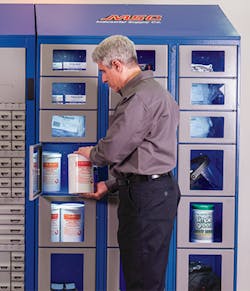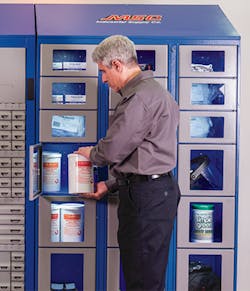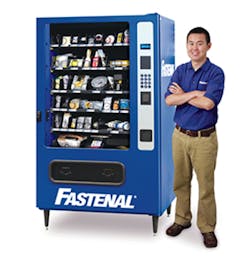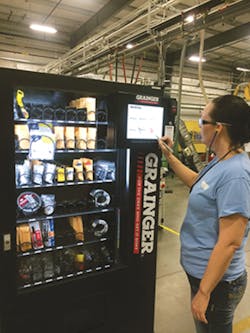Special Report: On-site vending machines provide work supplies
Mention vending machines, and typically, Doritos, Pepsi and Snickers come to mind.
But for plastics processors and other manufacturing companies, those self-serve product-dispensing devices can provide a means to access gloves, safety glasses and wrenches for the worker on the go.
Industrial equipment supply companies such as Fastenal Co., Winona, Minn., and MSC Industrial Supply Co. Inc., Melville, N.Y., have developed this idea into an increasingly popular way for companies to buy their goods.
Fastenal made a large investment in equipment vending machines in 2008, to make a previously expensive concept available to the business masses, said Kevin Fitzgerald, VP of the company's solutions area. The company saw a growing need to provide commonly used consumable products at the point of use.
"The aim of it was: How do we leverage the fact that we can provide a vending machine that reduces consumption, that controls inventory, that has the product readily available?" he said.
While Fastenal's machines employ the same coil-style display as snack machines, the software is more complicated. The machines use cloud-based software that records each transaction, including who's accessing materials and what the person is getting. The software can also restrict access to products, depending on employees' roles and needs. It can be a strong tool to reduce consumption.
"We also have access to that software to see exactly what inventory is moving, what inventory is not moving so much," Fitzgerald said. "As we see inventory move, we'll replenish the machine, so that it's fully stocked for our customers."
MSC
MSC was one of the first national distributors to introduce industrial vending in 2003, said Bill Welch, the company's senior director of inventory management solutions and strategic sales operations. The company stresses a "one-size-doesn't-fit-all" philosophy, offering a variety of options along with vending — but that often is the best choice. The company's specialists perform an inventory-management assessment with the customer and tailor a plan to fit its needs.
MSC offers a number of vending styles. The ControlPoint Drawer system is for customers that require tight security over freqently used items. The ControlPoint Carousel unit works for companies that use moderate quantities of a lot of different items. For customers that don't need individual item control, MSC offers the ControlPoint Cabinet; a version of it, the Dual Security Cabinet, offers a mix of individual-item and inventory-level control. Lastly, MSC markets the ControlPoint Locker for larger items and maintenance, repair and operations (MRO) supplies. Tools that will be used and then returned, such as quality-control measuring devices, can also be kept in the locker.
The manufacturing market is by far Fastenal's largest customer sector, with more than 25,000 machines supplied from the company's 2,600 nationwide stores. Fastenal has about 1,000 plastics industry customers in North America with about 3,000 machines. Welch said MSC has thousands of machines, but the firm doesn't provide specific numbers.
The economic downturn in 2008 led companies to focus more on indirect supply management, Welch said. "Over the last five years, the recognition of vending as a solution has grown substantially across all manufacturing segments."
FASTENAL
The Fastenal machines are customized for each company. "If we're calling on a plastics industry customer what we typically will do is, work with them first and foremost on what they want in the machines," Fitzgerald said. "If they're not 100 percent sure what to put in there, that's when we really get into some industry-specific information." Fastenal might draw upon experience with a similar plastics industry customer as an example of what to stock in the machines.
At least half of what Fastenal supplies in the machines is safety-related. Other popular items are MRO items such as duct tape, batteries and utility blades. With MSC, it's a combination of metalworking tooling supplies, as well as MRO items. For the plastics industry, Welch said those tools include cutting equipment.
With the Fastenal system, employees have access through a card — often their employee badge, or a code that's typed in.
Cost savings is one of the biggest advantages Fitzgerald sees for a vending machine program. A typical customer may see a 20-30 percent reduction in consumption of products made available by a secure machine only to employees who need them.
For MSC, it's about visibility and control. "What our solution does for our customers is, it gives them insight into what they're using, when they use it and where it's being used," Welch said. "When you think about vending, it gives you that visibility into exactly what's being used on the floor rather than somebody actually trying to manually calculate what's needed next." It also can show when usage of an item suddenly increases, and indicate when machines may need servicing, based on ramped-up consumption of certain products.
Another advantage Fitzgerald sees "is making sure you have the product you need, where you need it. So instead of not having it, then getting in your truck and driving to a store to pick it up, it's right there for you." Also, in large facilities that can stretch several hundred yards, there's a cost savings in time if a vending machine is nearby, as opposed to having employees walk to a tool room.
Welch pointed to vending as a means to optimize the supply chain. "Our solution, it will reduce the number of suppliers that a customer has to deal with to manage their supply chain."
For Fastenal, the only cost to the customer beyond the fee for the product itself is a yearly software charge, which comes to about $30 to $40 a month. Welch said with MSC there is no extra charge for vending.
Packaging the product is one challenge for the vending machine suppliers. But Fitzgerald said Fastenal works closely with its suppliers to avoid bulk packaging.
The key to success in a vending machine program, Fitzgerald said, is having local service. "It's changed a lot of how our customers are buying, it's changed a lot of how our competitors are now selling, and it's changed how we sell, as well."
Welch sees a challenge in shifting the customer's overall view. "Customers have to look at their business from a total cost standpoint rather than just a product cost standpoint," he said. "Typically, product costs represent a small percentage of their total costs when you look at labor, machine time and everything else that goes on within a shop floor."
He said customers need to take an active role in making vending a success in their facility. Customers need to see the vending solution holistically, as well as in the context of the partnership they have with MSC. The customer also should realize that vending might not solve all its inventory-management needs.
The following are examples of vending-machine activities by plastics processors.
ROWMARK
Rowmark LLC, a Findlay, Ohio, extruder of engravable plastic sheet, uses a Fastenal system that supplies Rowmark with gloves, earplugs, safety glasses, heat-resistant sleeves, rags, tape, labels, knives, blades, glass cleaner, small hand tools and other materials in two plants in Findlay. Employees use a card to get items.
"So we can track if we need to, by item, by user, just to see what usage is and if we have any people that are maybe using more than they should be — things like that," said Eric Hausserman, Rowmark's VP of business integration. The program started about four years ago.
Fastenal customizes the products to Rowmark's needs, he said. "Some of the specific tools are like Allen wrenches, things like that, (which) are very specific to our equipment."
Hausserman said it's hard to pinpoint specific monthly usage, because the company stocks a lot of different items. "It's used a lot. It's used by the employees daily." Fastenal comes in weekly and restocks the machines, running regular usage reports and discussing trends with Rowmark supervisors.
Hausserman believes the company spends a couple hundred dollars a month on general supplies. Because such purchases are now tracked, he estimated, "we saved about 10-15 percent by going to this system."
It's a program Hausserman definitely recommends. "It can become kind of unmanageable and out of control when you have those kinds of items out in the open, and you lose track of how much you're going through, like gloves, things like that."
A company can use it to the extent it wants, to manage potential overusage and changing needs. "If we see a particular glove usage going way up, we would run a report just to see what's going on; maybe we should buy a different glove, if one was wearing out too fast for die changes, things like that," he said.
Hausserman sees no downside. "It's pretty much a no-brainer."
CURRIER PLASTICS
Custom injection and blow molder Currier Plastics Inc., Auburn, N.Y., is another firm that employs vending machines at its operation, one each in its injection molding and blow molding plants. Employees use the same key that they use to enter the building to access products from the vending machine. That allows Currier to track usage — an important point for the company.
"The biggest thing with this is accountability," said Todd Lindsay, injection molding engineering manager with Currier. "You know how important this pen is now? An operator probably would have just gone into the office and grabbed another pen every day, but now it's all monitored."
Also key for Currier is that employees do not have access to products they don't need. If the employee is in a role that does not require a certain power tool, for example, he or she cannot take the tool from the machine.
"They have to have the rights to use it," said Scott Reilly, blow molding department manager at Currier. "These are great. I wouldn't have it any other way."
And the company doesn't pay for any of the products until they are removed from the machine by an employee.
Allan Gerlat, correspondent
Managing editor Angie DeRosa contributed to this article.
Contact:
Currier Plastics Inc., 315-255-1779, www.currierplastics.com
Fastenal Co., 507-454-5374, www.fastenal.com
MSC Industrial Supply Co., 800-645-7270, www.mscdirect.com
Rowmark LLC, 419-425-8974, www.rowmarkllc.com



